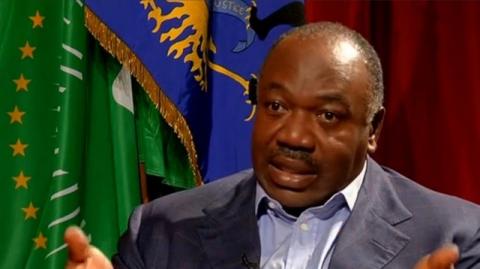Advertisement
Gabon president Bongo sworn in after disputed poll
LIBREVILLE (Reuters) - Gabon President Ali Bongo was sworn in for a second term on Tuesday and called for unity following a razor-thin election victory whose integrity was questioned by international observers.
Bongo's victory by less than 6,000 votes has drawn unwelcome scrutiny of the president, whose family has ruled the oil-producing state in Central Africa for 49 years. Just a handful of African leaders attended his inauguration.
France called for a recount and the European Union said it found anomalies in Bongo's stronghold province of Haut-Ogooue, where he won 95 percent of the vote on a 99.9 percent turnout. Opposition leader Jean Ping said the election was rigged.
Bongo, wearing a suit with a red sash, swore on a copy of the constitution to ensure his citizens' wellbeing. Leaders from Mali, Togo, Niger and Sao Tome and Principe and local officials watched the ceremony at the presidential palace.
"The elections are over. We must move on to other things," said Bongo in an acceptance speech that drew cheers from the crowd and was marked with celebratory cannon fire.
Violence was feared when the Constitutional Court on Friday declined Ping's petition for a recount and ratified the result, but did not materialize. The inauguration ceremony was however kept relatively low-key.
Riot gear was laid out alongside military vehicles on main streets and fighter jets flew low overhead, but many residents did not even know the ceremony was taking place.
"I invite all the major stakeholders in the nation to sit down together in order to find solutions that will satisfy our compatriots," said Bongo, whose election in 2009 after the death of his long-ruling father was also disputed.
He added that a new government would be formed "in the next few days". Bongo has previously told Reuters that he will most likely invite leading opposition figures to join it.
At least six people died in clashes between protesters and security forces when the initial results of the Aug. 27 vote were announced.
Ping has rejected Friday's court ruling as biased, and the European Union said doubts about the integrity of the process were legitimate. The United States acknowledged the ruling, calling for details of its proceedings to be made public.
The ceremony was announced to the press only the day before.
Bongo has sought to cast himself as a dynamic leader seeking better governance in a region notorious for corruption, but his perceived failure to distribute Gabon's oil riches more evenly among the population of 1.8 million has caused resentment.
The conduct of the poll may hurt his international reputation as a reformer, analysts said.
(Additional reporting by Gerauds Wilfried Obangome; Writing by Nellie Peyton and Emma Farge; Editing by Matthew Mpoke Bigg and Andrew Roche)



















Add new comment